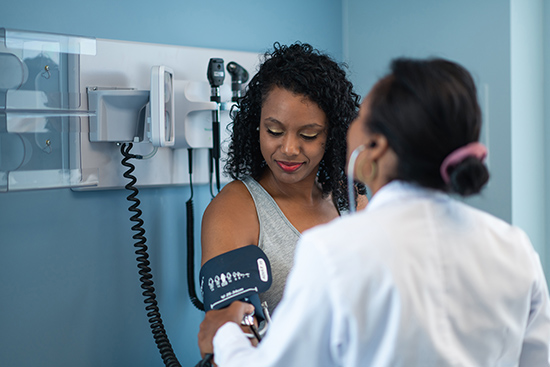
Approximately one in three Americans has high blood pressure, but because it has no symptoms, many people don’t even know it is present. This is why it is often referred to as the “silent killer.”
High blood pressure is usually not taken seriously enough. Left untreated, high blood pressure can cause a variety of health issues including stroke, heart attack, heart failure, atrial fibrillation, vision problems and kidney failure. I recommend people get their blood pressure checked regularly and start taking preventive action before it reaches levels that are considered high.
Need help controlling your blood pressure? Call 800.922.0000 to schedule an appointment with one of our cardiologists for an evaluation.
A blood pressure of less than 120/80 mmHg is considered ideal. Levels of 120/80 to 129/80 are considered elevated, deserve attention, and possibly treatment pending other medical problems. When levels hover in this area, one’s risk of developing hypertension is much more significant unless preventive action is taken. In addition, the damage caused by hypertension is believed to begin even if you are in the elevated category of hypertension.
If you have elevated pressures, you should evaluate your lifestyle habits and begin taking positive steps to improve your diet, develop a regular exercise routine if you haven’t already, use sodium in moderation, lose weight, limit alcohol intake, avoid smoking and exposure to tobacco smoke and reduce stress. You can drop your blood pressure numbers by 5 to 10% with lifestyle changes alone. We should all understand that a small decrease in systolic blood pressure, as little as 3 to 5 mmHg, has a significant effect on the risk of stroke and heart attacks. A little change can have a big impact.
A blood pressure of 130/80 or higher is considered high blood pressure. It is especially recommended that people with heart disease, diabetes or renal disease keep their blood pressure below 120/80 since they are already at high risk for heart disease or recurrent heart disease. If your blood pressure is higher than 180/120, it is considered a hypertensive crisis and you should consult your doctor immediately.
While diet and lifestyle modifications are considered first-line treatments, many if not most patients will still need to be treated with multiple anti-hypertensive agents to control their blood pressure. Performing diet and lifestyle modifications will help limit the number of medications needed to reach your optimal goal.





